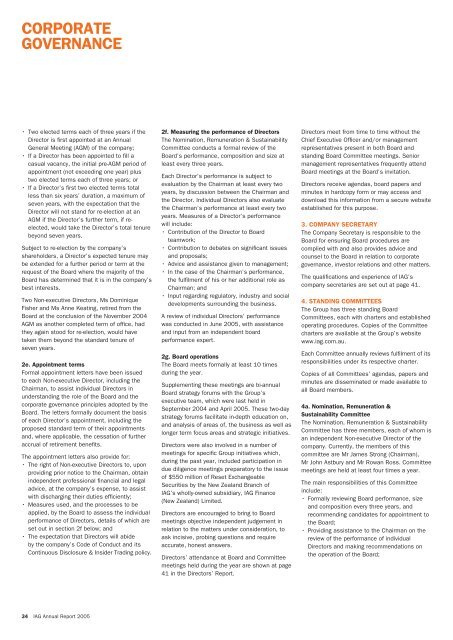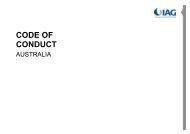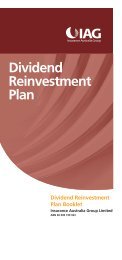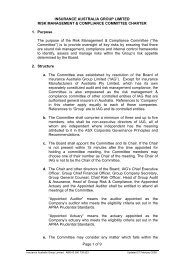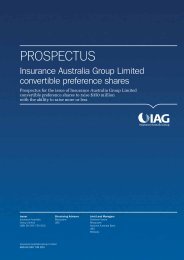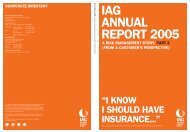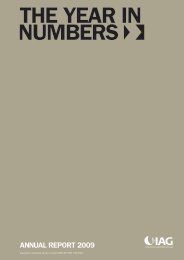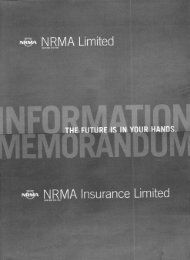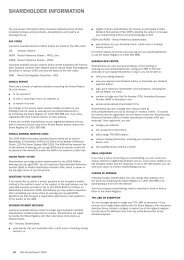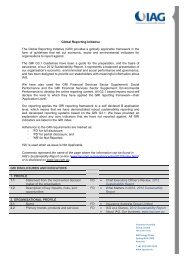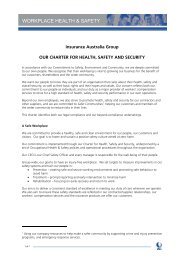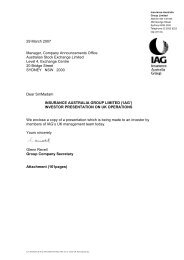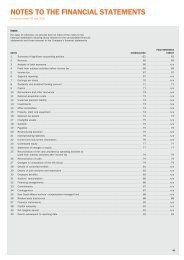IAG annual report—Concise
IAG annual report—Concise
IAG annual report—Concise
Create successful ePaper yourself
Turn your PDF publications into a flip-book with our unique Google optimized e-Paper software.
CORPORATE<br />
GOVERNANCE<br />
• Two elected terms each of three years if the<br />
Director is first appointed at an Annual<br />
General Meeting (AGM) of the company;<br />
• If a Director has been appointed to fill a<br />
casual vacancy, the initial pre-AGM period of<br />
appointment (not exceeding one year) plus<br />
two elected terms each of three years; or<br />
• If a Director’s first two elected terms total<br />
less than six years’ duration, a maximum of<br />
seven years, with the expectation that the<br />
Director will not stand for re-election at an<br />
AGM if the Director’s further term, if reelected,<br />
would take the Director’s total tenure<br />
beyond seven years.<br />
Subject to re-election by the company’s<br />
shareholders, a Director’s expected tenure may<br />
be extended for a further period or term at the<br />
request of the Board where the majority of the<br />
Board has determined that it is in the company’s<br />
best interests.<br />
Two Non-executive Directors, Ms Dominique<br />
Fisher and Ms Anne Keating, retired from the<br />
Board at the conclusion of the November 2004<br />
AGM as another completed term of office, had<br />
they again stood for re-election, would have<br />
taken them beyond the standard tenure of<br />
seven years.<br />
2e. Appointment terms<br />
Formal appointment letters have been issued<br />
to each Non-executive Director, including the<br />
Chairman, to assist individual Directors in<br />
understanding the role of the Board and the<br />
corporate governance principles adopted by the<br />
Board. The letters formally document the basis<br />
of each Director’s appointment, including the<br />
proposed standard term of their appointments<br />
and, where applicable, the cessation of further<br />
accrual of retirement benefits.<br />
The appointment letters also provide for:<br />
• The right of Non-executive Directors to, upon<br />
providing prior notice to the Chairman, obtain<br />
independent professional financial and legal<br />
advice, at the company’s expense, to assist<br />
with discharging their duties efficiently;<br />
• Measures used, and the processes to be<br />
applied, by the Board to assess the individual<br />
performance of Directors, details of which are<br />
set out in section 2f below; and<br />
• The expectation that Directors will abide<br />
by the company’s Code of Conduct and its<br />
Continuous Disclosure & Insider Trading policy.<br />
2f. Measuring the performance of Directors<br />
The Nomination, Remuneration & Sustainability<br />
Committee conducts a formal review of the<br />
Board’s performance, composition and size at<br />
least every three years.<br />
Each Director’s performance is subject to<br />
evaluation by the Chairman at least every two<br />
years, by discussion between the Chairman and<br />
the Director. Individual Directors also evaluate<br />
the Chairman’s performance at least every two<br />
years. Measures of a Director’s performance<br />
will include:<br />
• Contribution of the Director to Board<br />
teamwork;<br />
• Contribution to debates on significant issues<br />
and proposals;<br />
• Advice and assistance given to management;<br />
• In the case of the Chairman’s performance,<br />
the fulfilment of his or her additional role as<br />
Chairman; and<br />
• Input regarding regulatory, industry and social<br />
developments surrounding the business.<br />
A review of individual Directors’ performance<br />
was conducted in June 2005, with assistance<br />
and input from an independent board<br />
performance expert.<br />
2g. Board operations<br />
The Board meets formally at least 10 times<br />
during the year.<br />
Supplementing these meetings are bi-<strong>annual</strong><br />
Board strategy forums with the Group’s<br />
executive team, which were last held in<br />
September 2004 and April 2005. These two-day<br />
strategy forums facilitate in-depth education on,<br />
and analysis of areas of, the business as well as<br />
longer term focus areas and strategic initiatives.<br />
Directors were also involved in a number of<br />
meetings for specific Group initiatives which,<br />
during the past year, included participation in<br />
due diligence meetings preparatory to the issue<br />
of $550 million of Reset Exchangeable<br />
Securities by the New Zealand Branch of<br />
<strong>IAG</strong>’s wholly-owned subsidiary, <strong>IAG</strong> Finance<br />
(New Zealand) Limited.<br />
Directors are encouraged to bring to Board<br />
meetings objective independent judgement in<br />
relation to the matters under consideration, to<br />
ask incisive, probing questions and require<br />
accurate, honest answers.<br />
Directors’ attendance at Board and Committee<br />
meetings held during the year are shown at page<br />
41 in the Directors’ Report.<br />
Directors meet from time to time without the<br />
Chief Executive Officer and/or management<br />
representatives present in both Board and<br />
standing Board Committee meetings. Senior<br />
management representatives frequently attend<br />
Board meetings at the Board’s invitation.<br />
Directors receive agendas, board papers and<br />
minutes in hardcopy form or may access and<br />
download this information from a secure website<br />
established for this purpose.<br />
3. COMPANY SECRETARY<br />
The Company Secretary is responsible to the<br />
Board for ensuring Board procedures are<br />
complied with and also provides advice and<br />
counsel to the Board in relation to corporate<br />
governance, investor relations and other matters.<br />
The qualifications and experience of <strong>IAG</strong>’s<br />
company secretaries are set out at page 41.<br />
4. STANDING COMMITTEES<br />
The Group has three standing Board<br />
Committees, each with charters and established<br />
operating procedures. Copies of the Committee<br />
charters are available at the Group’s website<br />
www.iag.com.au.<br />
Each Committee <strong>annual</strong>ly reviews fulfilment of its<br />
responsibilities under its respective charter.<br />
Copies of all Committees’ agendas, papers and<br />
minutes are disseminated or made available to<br />
all Board members.<br />
4a. Nomination, Remuneration &<br />
Sustainability Committee<br />
The Nomination, Remuneration & Sustainability<br />
Committee has three members, each of whom is<br />
an independent Non-executive Director of the<br />
company. Currently, the members of this<br />
committee are Mr James Strong (Chairman),<br />
Mr John Astbury and Mr Rowan Ross. Committee<br />
meetings are held at least four times a year.<br />
The main responsibilities of this Committee<br />
include:<br />
• Formally reviewing Board performance, size<br />
and composition every three years, and<br />
recommending candidates for appointment to<br />
the Board;<br />
• Providing assistance to the Chairman on the<br />
review of the performance of individual<br />
Directors and making recommendations on<br />
the operation of the Board;<br />
34 <strong>IAG</strong> Annual Report 2005


